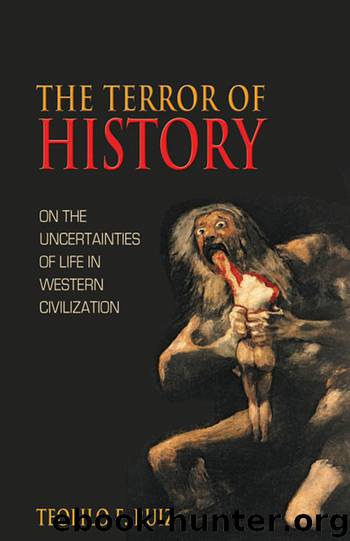The Terror of History by Teofilo F. Ruiz

Author:Teofilo F. Ruiz
Language: eng
Format: epub
ISBN: 9781400839421
Publisher: Princeton University Press
History and the World of Matter
If what I describe here is easily understood, part of our experience, part of our need for physical and emotional comfort, how can it then be postulated as an escape from history? I will argue that history and historical process are driven by a multitude of forces: social, economic, cultural, geographical, demographic, and others factors. But history is also driven by the willingness of individuals and groups to put up with a lot of grief, to sublimate their needs and desires, and to go on doing their jobs doggedly in the face of overwhelming odds. I am, of course, not saying anything new. Joseph R. Strayer said as much in a short article (his American Historical Association presidential address in the early 1970s) about the promise of the fourteenth century. How was it, he asked, that when Western medieval society was beset by the ghosts of famine, plague, war, and revolution, the basic structures of government, learning, and belief survived? They did so because countless people, as noted in the preface, kept doing their jobs. When we do not, when we escape, then we are challenging the workings of history.
I admit that at no time in the short story of mankind have we been completely tempted to revert to a world without order, a world of unlimited violence and pleasure. Sporadic episodes of such bouts of unrestrained behavior however remind us that the dream of such escapes remains a powerful force in human culture, though more often than not more of a dream than a reality. Later, I will explore some of the lesser manifestations of this mythic desire for escape from historical processes or from the ever-evolving nature of power. For now, it may just be sufficient to remember that flights into the materiality of the world come in two forms: in small doses almost every one of us indulges in some form of physical pleasure. Such indulgence functions as the body’s natural and necessary response to the stress of everyday life. And then there are those unique moments in which the fabric of the quotidian, the assurances provided by social structures, fall down. Left to our own devices, we flee responsibility and the future while gulping down the here and now. This second response is most often a collective one. It was what many of Florence’s citizens, and people in other places in Western Europe did when battered by the plague in 1348.
Catastrophic events or the unbearable tedium and anxieties of everyday life however are not the sole motivation for such denial of everything but the present moment. Awareness of the futility of our lives, again both individual and collective, may lead us in many different ways—to religion, to aestheticism, to the senses. In the ancient world religion was often deeply bound with the body and the pleasures and sensations of the body. One could engage in Bacchic debauchery and still be observing a religious duty and ritual. It was not until the
Download
This site does not store any files on its server. We only index and link to content provided by other sites. Please contact the content providers to delete copyright contents if any and email us, we'll remove relevant links or contents immediately.
| Anthropology | Archaeology |
| Philosophy | Politics & Government |
| Social Sciences | Sociology |
| Women's Studies |
The remains of the day by Kazuo Ishiguro(7551)
Tools of Titans by Timothy Ferriss(6950)
The Black Swan by Nassim Nicholas Taleb(6192)
Inner Engineering: A Yogi's Guide to Joy by Sadhguru(5897)
Giovanni's Room by James Baldwin(5879)
The Way of Zen by Alan W. Watts(5800)
The Six Wives Of Henry VIII (WOMEN IN HISTORY) by Fraser Antonia(4791)
The Power of Now: A Guide to Spiritual Enlightenment by Eckhart Tolle(4756)
Astrophysics for People in a Hurry by Neil DeGrasse Tyson(4620)
Asking the Right Questions: A Guide to Critical Thinking by M. Neil Browne & Stuart M. Keeley(4576)
12 Rules for Life by Jordan B. Peterson(3734)
The Ethical Slut by Janet W. Hardy(3504)
Skin in the Game by Nassim Nicholas Taleb(3462)
Housekeeping by Marilynne Robinson(3402)
The Art of Happiness by The Dalai Lama(3385)
Double Down (Diary of a Wimpy Kid Book 11) by Jeff Kinney(3275)
Skin in the Game: Hidden Asymmetries in Daily Life by Nassim Nicholas Taleb(3264)
Walking by Henry David Thoreau(3235)
12 Rules for Life: An Antidote to Chaos by Jordan B. Peterson(3204)
